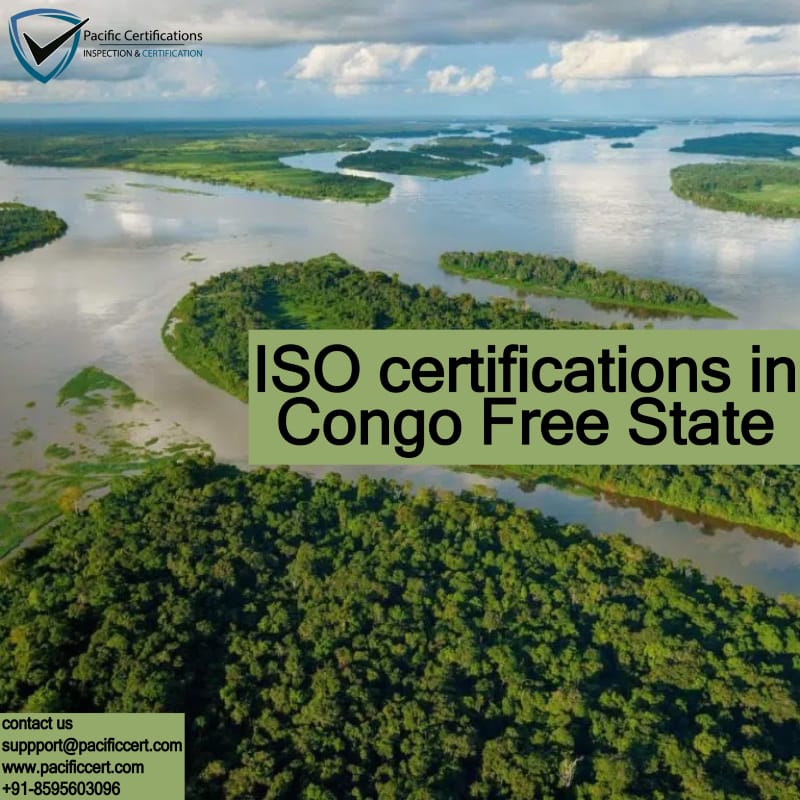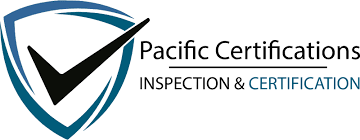ISO Certifications in Congo Free State, Popular Standards, Requirements and Benefits

Introduction
Obtaining ISO certifications in the Congo Free State or any other region involves adhering to specific standards and undergoing a series of audits to ensure that your organization meets the criteria set by the International Organization for Standardization (ISO). ISO certifications are internationally recognized and provide significant benefits, including improved efficiency, reduced risk, enhanced customer satisfaction, and access to new markets.
ISO Applicable Standards
Several ISO standards are applicable to various sectors and can benefit organizations in the Congo Free State. Some of the key standards include:
ISO 9001:
This standard focuses on quality management systems (QMS). It helps organizations ensure that they meet customer and other stakeholder needs within statutory and regulatory requirements related to a product or service.
ISO 14001:
This standard is centered around environmental management systems (EMS). It provides a framework for companies to protect the environment and respond to changing environmental conditions in balance with socio-economic needs.
ISO 45001:
This standard specifies requirements for an occupational health and safety (OH&S) management system, to enable organizations to provide safe and healthy workplaces by preventing work-related injury and ill health, as well as by proactively improving its OH&S performance.
ISO 27001:
This standard pertains to information security management systems (ISMS). It helps organizations keep information assets secure, including financial information, intellectual property, employee details, and information entrusted by third parties.
Product Certifications (CE, HACCP, GMP, etc.):
These certifications are specific to products and relate to safety, quality, and compliance with European Union standards (CE), food safety (HACCP), and good manufacturing practices (GMP).
Click here to find out more applicable standards to your industry
Requirements of ISO Certifications in Congo Free State
The requirements for obtaining ISO certifications in any region, including the Congo Free State, revolve around the specific standards for which the certification is sought. Each ISO standard has its set of specific requirements that an organization must meet to achieve certification. However, there are some commonalities across many of these standards related to the establishment, maintenance, and continuous improvement of management systems. Below, we will discuss the general requirements alongside specific requirements for some of the most sought-after ISO certifications.
Common Requirements Across ISO Certifications
Management System Establishment: Organizations need to establish a management system compliant with the chosen ISO standard. This system should cover all areas of the business impacted by the standard and be designed to meet the standard's requirements effectively.
Documentation: Adequate documentation is crucial. This includes policies, objectives, procedures, records, and evidence of compliance. Documentation requirements vary by standard but generally serve to demonstrate the organization’s adherence to the ISO requirements.
Leadership Commitment: Top management must demonstrate leadership and commitment to the management system. This involves ensuring the integration of the management system into the organization's business processes, providing the necessary resources, and communicating the importance of effective management and compliance with the standard.
Risk Management: Many ISO standards require organizations to identify, assess, and manage risks related to their specific management system. This proactive approach aims to mitigate potential non-conformities and enhance the system's effectiveness.
Continuous Improvement: ISO standards emphasize continuous improvement of the management system. Organizations must regularly review and improve their processes, addressing any non-conformities and taking action to prevent them in the future.
Specific Requirements
ISO 9001 (Quality Management Systems): Focus on customer satisfaction, process approach, and continual improvement. Organizations must prove their ability to consistently provide products and services that meet customer and regulatory requirements.
ISO 14001 (Environmental Management Systems): Emphasis on effective environmental management, reduction of environmental impact, and compliance with environmental regulations. Organizations need to demonstrate their commitment to environmental protection and prevention of pollution.
ISO 45001 (Occupational Health and Safety Management Systems): Requirements include providing a safe and healthy workplace, preventing work-related injury and illness, and continual improvement of OH&S performance.
ISO 27001 (Information Security Management Systems): Focus on protecting the confidentiality, integrity, and availability of information. Organizations must identify information security risks and implement appropriate controls to manage or mitigate these risks.
How Pacific Certifications Can Assist?
Pacific Certifications can facilitate the process of obtaining ISO certifications in the Congo Free State by providing guidance on meeting these requirements through:
Training and Awareness:
Offering training programs to ensure that your staff understands the ISO standards and how to implement them effectively within your organization.
Audit Preparation:
Assisting in preparing for the certification audit by conducting pre-audit assessments and helping address any potential non-conformities.
Certification and Beyond:
Guiding you through the certification audit process and providing ongoing support to ensure that your management system remains compliant and continues to improve over time.
By addressing these requirements with the support of an experienced certification body like Pacific Certifications, organizations in the Congo Free State can achieve ISO certification, demonstrating their commitment to international standards of quality, safety, environmental management, or information security, depending on the specific standards they seek to comply with.
Benefits of ISO Certifications in Congo Free State
ISO certifications in regions such as the Congo Free State bring a myriad of benefits to organizations that go beyond just meeting statutory and regulatory requirements. These benefits touch on various aspects of the business, including operational, environmental, and societal impacts. Here's how ISO certifications can positively influence organizations within the Congo Free State or similar contexts:
Enhanced Quality and Efficiency
Improved Product Quality: ISO certifications, such as ISO 9001, focus on quality management systems that ensure products and services meet customer expectations and regulatory requirements consistently.
Increased Efficiency: Implementing ISO standards requires organizations to analyze their processes critically, leading to more efficient use of resources and reduction in waste.
Market Expansion and Customer Satisfaction
Access to New Markets: Many markets and clients require suppliers to be ISO certified. Certifications can open doors to new business opportunities both locally and internationally.
Enhanced Customer Satisfaction: By adhering to ISO standards, organizations can improve their service reliability, leading to increased customer satisfaction and loyalty.
Compliance and Risk Management
Regulatory Compliance: ISO standards often align with legal and regulatory requirements, helping organizations ensure they meet these obligations and avoid penalties.
Improved Risk Management: ISO standards such as ISO 27001 for information security and ISO 45001 for occupational health and safety emphasize risk assessment and management, helping organizations to preemptively address potential issues.
Environmental and Social Responsibility
Environmental Impact: ISO 14001 helps organizations minimize their environmental footprint by setting out criteria for an effective environmental management system. This can lead to reduced waste and energy use, contributing to environmental sustainability.
Health and Safety: ISO 45001 promotes safer working conditions, helping to protect employees from workplace hazards and reducing the likelihood of occupational accidents and diseases.
Competitive Advantage and Financial Performance
Competitive Advantage: Being ISO certified can differentiate an organization from its competitors, providing a competitive edge in the market.
Financial Performance: The efficiency gains, customer satisfaction, and market expansion associated with ISO certifications can lead to improved financial performance and profitability.
How Pacific Certifications Can Enhance These Benefits?
Pacific Certifications can amplify the benefits of ISO certifications for organizations in the Congo Free State through:
Tailored Support: Offering customized support to meet the specific needs of your organization, ensuring that the ISO standards are implemented in the most effective way.
Expertise and Insight: Leveraging deep expertise and industry insights to guide your organization through the certification process, identifying opportunities for improvement that you might not have recognized.
Ongoing Improvement: Providing tools and training for continuous improvement, ensuring that your organization not only achieves certification but also maintains and builds upon these standards over time.
International Recognition: As an accredited certification body, Pacific Certifications provides certifications that are recognized globally, enhancing your organization’s credibility on the international stage.
Overall, ISO certifications can serve as a powerful tool for organizations in the Congo Free State to improve their operations, fulfil their compliance obligations, and achieve their business goals. With the support of Pacific Certifications, the journey toward ISO certification can become more streamlined, ensuring that organizations fully realize the potential benefits of their ISO compliance efforts.
Which industries need ISO Certifications in Congo Free State?
ISO certifications are applicable across a wide range of industries worldwide, including in the Congo Free State, due to their focus on quality, safety, environmental management, information security, and other critical aspects of business operations. While almost any industry can benefit from obtaining ISO certifications, there are specific sectors where these certifications are particularly vital, either due to regulatory requirements, customer expectations, or the inherent risks associated with the industry. Here's an overview of industries that often require or benefit significantly from ISO certifications in regions like the Congo Free State:
Manufacturing
Quality Management (ISO 9001): Ensures consistent quality and reliability of products, which is crucial in manufacturing to meet customer expectations and regulatory requirements.
Environmental Management (ISO 14001): Helps manage environmental impacts and ensures compliance with environmental laws and regulations, which is especially important for manufacturing industries that have significant environmental footprints.
Healthcare
Quality Management (ISO 9001): Enhances the quality and efficiency of healthcare services, improving patient satisfaction and safety.
Information Security (ISO 27001): Protects patient data and ensures confidentiality, integrity, and availability of information, which is critical in the digitalization of healthcare records.
Information Technology and Telecommunications
Information Security (ISO 27001): Critical for protecting data and ensuring the reliability and security of IT systems and services.
Service Management (ISO/IEC 20000): Ensures IT services are aligned with the needs of the business and customers, promoting efficiency and effectiveness in service delivery.
Construction and Engineering
Quality Management (ISO 9001): Ensures projects are completed to specification, on time, and within budget, enhancing customer satisfaction and operational efficiency.
Environmental Management (ISO 14001): Helps manage the environmental impact of construction activities, promoting sustainable practices.
Food and Agriculture
Food Safety Management (ISO 22000): Ensures the safety and quality of food products, from production to consumption, critical for protecting consumer health and meeting regulatory requirements.
Environmental Management (ISO 14001): Important for minimizing the environmental impact of farming and food production processes.
Energy and Utilities
Environmental Management (ISO 14001): Essential for managing the environmental impact of energy production and utility services, including waste management and resource conservation.
Quality Management (ISO 9001): Ensures reliable and efficient service delivery, which is crucial in energy and utilities sectors.
Mining
Environmental Management (ISO 14001): Critical for managing the significant environmental impacts associated with mining activities, including land degradation, water pollution, and biodiversity loss.
Occupational Health and Safety (ISO 45001): Essential for ensuring the safety and health of workers in an industry known for high-risk working conditions.
Education
Quality Management (ISO 9001): Enhances the quality of education and training services, ensuring that educational institutions meet the needs and expectations of students and other stakeholders.
Logistics and Transportation
Quality Management (ISO 9001): Ensures the efficient and reliable delivery of goods and services, enhancing customer satisfaction and operational performance.
Environmental Management (ISO 14001): Helps minimize the environmental impact of transportation and logistics activities.
Conclusion
Organizations in these and other industries in the Congo Free State can benefit from the structured approach to management that ISO certifications provide. By working with a certification body like Pacific Certifications, organizations can navigate the process of obtaining and maintaining ISO certifications, leveraging these standards to enhance their competitiveness, efficiency, and compliance, while also contributing to their sustainability goals.
Pacific Certifications is accredited by ABIS, in case you need support with ISO certification for your business in Congo Free State, please contact us at [email protected] or +91-8595603096.
Ready to get ISO certified?
Contact Pacific Certifications to begin your certification journey today!
Suggested Certifications –
Read more: Pacific Blogs

